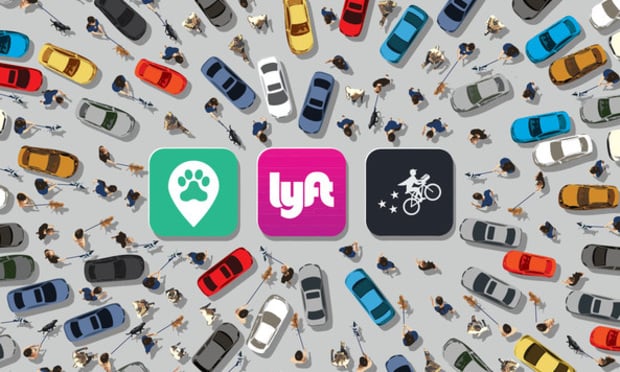Will California's New Worker Classification Test Be Applied Retroactively? One Judge Says Yes
Plaintiffs lawyers were buoyed last week after an Orange County judge concluded a California Supreme Court landmark decision on worker classification should be applied retroactively.
July 23, 2018 at 06:12 PM
5 minute read
 Photo: Daniel Hertzberg for ALM
Photo: Daniel Hertzberg for ALM
Gig economy companies and judges are grappling with the California Supreme Court ruling that upended how employers classify their workers, and whether the new test applies retroactively to businesses facing lawsuits has emerged as a central question.
The Supreme Court's decision in the case Dynamex Operations West v. Superior Court created a new worker classification standard—the “ABC” test—that is more rigid than the previously used scheme to determine whether a worker is an independent contractor or employee. The distinction is key in wage-and-hour disputes, as employees are entitled to benefits such as minimum wage and overtime.
The April ruling makes it more difficult for gig economy companies—whose business models are often based on independent contractors—to keep denying employee status to their workforce. Management-side attorneys contend the test is difficult to overcome, particularly because one aspect requires the employer to prove that the worker is performing work outside the usual course of the company's business.
In the aftermath of the ruling, business groups pressed the Supreme Court to clarify whether its decision applied retroactively—but the justices remained mum, turning down a request to modify the opinion to apply only to future disputes. The retroactive scope of the ruling is playing out now in state and federal courts, including in a worker misclassification dispute against online food-ordering portal Grubhub Inc. pending in federal appeals court.
Plaintiffs lawyers were buoyed last week following a ruling in their favor by an Orange County judge. Superior Court Judge William Claster, ruling in a dispute involving exotic dancers and the Anaheim-based company Imperial Showgirls, said the Supreme Court's decision in the Dynamex case does apply retroactively.
Claster said the Supreme Court could have said explicitly that the ruling applied only prospectively. “The lack of such a pronouncement suggests that the decision should apply retroactively,” the judge wrote.
Shannon Liss-Riordan of Lichten & Liss-Riordan, a lawyer for the adult dancers, said she is hopeful to use the Orange County ruling in pending disputes against Grubhub and lawsuits she filed in the wake of Dynamex against gig companies Lyft and Postmates.
“I think it's clear that Dynamex is retroactive,” Liss-Riordan said Monday in an interview. “With this decision, we will show in Grubhub that it doesn't make sense that it's not. It's a good first step in addressing that.”
➤➤ Get employment law news and commentary straight to your in-box with Labor of Law, a new Law.com briefing. Learn more and sign up here.
Lawyers from Jackson Lewis, which represented management in the dancers' case, did not immediately respond to requests for comment. Long & Levit was also on the defense team.
California courts could follow the Orange County decision and rule similarly in the mountain of cases that confront worker classification in California, Fisher Phillips partner Rich Meneghello wrote in a recent post.
“One of the biggest questions remaining about the test was whether it should be applied retroactively. In other words, should businesses be protected for having relied upon the current law for years, or should they be held liable for years of possible wage and hour violations under a brand test just adopted out of the blue?” Meneghello wrote. He added: “We'll see if other courts follow this same line of thinking, but for now, businesses appear to have a hurdle to overcome if they hope to limit the impact of the Dynamex case and shrink the application of the ABC test.”
The Grubhub dispute is pending in the U.S. Court of Appeals for the Ninth Circuit. The trial was one of the first tests of the gig economy's business model. A jury sided with the company that a driver for the on-demand food service company was not an employee. Liss-Riordan is pressing to apply the Dynamex decision in the case.
A team from Gibson, Dunn & Crutcher represents the company. “Grubhub has vigorously argued that applying Dynamex here would violate due process and contravene federal and state law,” Gibson Dunn's Theane Evangelis said in a court filing on June 28.
The scope of the consequences of the Dynamex ruling remain unclear, but the ruling could substantially affect on-demand companies.
David Winnett, a plaintiffs attorney at The Veen Firm in San Francisco, predicted the Dynamex ruling will change the way companies operate. Businesses such as Uber and other on-demand services have maintained a foothold in the marketplace because they worked around traditional labor regulations, he said.
“Businesses are going to have to change the way they operate, otherwise, they're going to violate regulations and face liability over and over again for failure to comply with wage and hour obligations to their employees,” Winnett said. “In many ways, it's a game changer. There are lawyers in different areas of practice watching how far-reaching this is going to be.”
Read more:
Business Advocates Urge Calif. to Limit Scope of Landmark Labor Case
Grubhub Resists 'Do-Over' in Worker's Classification Case After Landmark Ruling
2 New Suits Challenge Gig Worker Classification, And This Is Just the Beginning
Three Takeaways From the California Supreme Court's Gig Economy Ruling
This content has been archived. It is available through our partners, LexisNexis® and Bloomberg Law.
To view this content, please continue to their sites.
Not a Lexis Subscriber?
Subscribe Now
Not a Bloomberg Law Subscriber?
Subscribe Now
NOT FOR REPRINT
© 2025 ALM Global, LLC, All Rights Reserved. Request academic re-use from www.copyright.com. All other uses, submit a request to [email protected]. For more information visit Asset & Logo Licensing.
You Might Like
View All
Meta agrees to pay $25 million to settle lawsuit from Trump after Jan. 6 suspension
4 minute read
How We Won It: Latham Secures Back-to-Back ITC Patent Wins for California Companies
6 minute read
Trending Stories
- 1Two Wilkinson Stekloff Associates Among Victims of DC Plane Crash
- 2Two More Victims Alleged in New Sean Combs Sex Trafficking Indictment
- 3Jackson Lewis Leaders Discuss Firm's Innovation Efforts, From Prompt-a-Thons to Gen AI Pilots
- 4Trump's DOJ Files Lawsuit Seeking to Block $14B Tech Merger
- 5'No Retributive Actions,' Kash Patel Pledges if Confirmed to FBI
Who Got The Work
J. Brugh Lower of Gibbons has entered an appearance for industrial equipment supplier Devco Corporation in a pending trademark infringement lawsuit. The suit, accusing the defendant of selling knock-off Graco products, was filed Dec. 18 in New Jersey District Court by Rivkin Radler on behalf of Graco Inc. and Graco Minnesota. The case, assigned to U.S. District Judge Zahid N. Quraishi, is 3:24-cv-11294, Graco Inc. et al v. Devco Corporation.
Who Got The Work
Rebecca Maller-Stein and Kent A. Yalowitz of Arnold & Porter Kaye Scholer have entered their appearances for Hanaco Venture Capital and its executives, Lior Prosor and David Frankel, in a pending securities lawsuit. The action, filed on Dec. 24 in New York Southern District Court by Zell, Aron & Co. on behalf of Goldeneye Advisors, accuses the defendants of negligently and fraudulently managing the plaintiff's $1 million investment. The case, assigned to U.S. District Judge Vernon S. Broderick, is 1:24-cv-09918, Goldeneye Advisors, LLC v. Hanaco Venture Capital, Ltd. et al.
Who Got The Work
Attorneys from A&O Shearman has stepped in as defense counsel for Toronto-Dominion Bank and other defendants in a pending securities class action. The suit, filed Dec. 11 in New York Southern District Court by Bleichmar Fonti & Auld, accuses the defendants of concealing the bank's 'pervasive' deficiencies in regards to its compliance with the Bank Secrecy Act and the quality of its anti-money laundering controls. The case, assigned to U.S. District Judge Arun Subramanian, is 1:24-cv-09445, Gonzalez v. The Toronto-Dominion Bank et al.
Who Got The Work
Crown Castle International, a Pennsylvania company providing shared communications infrastructure, has turned to Luke D. Wolf of Gordon Rees Scully Mansukhani to fend off a pending breach-of-contract lawsuit. The court action, filed Nov. 25 in Michigan Eastern District Court by Hooper Hathaway PC on behalf of The Town Residences LLC, accuses Crown Castle of failing to transfer approximately $30,000 in utility payments from T-Mobile in breach of a roof-top lease and assignment agreement. The case, assigned to U.S. District Judge Susan K. Declercq, is 2:24-cv-13131, The Town Residences LLC v. T-Mobile US, Inc. et al.
Who Got The Work
Wilfred P. Coronato and Daniel M. Schwartz of McCarter & English have stepped in as defense counsel to Electrolux Home Products Inc. in a pending product liability lawsuit. The court action, filed Nov. 26 in New York Eastern District Court by Poulos Lopiccolo PC and Nagel Rice LLP on behalf of David Stern, alleges that the defendant's refrigerators’ drawers and shelving repeatedly break and fall apart within months after purchase. The case, assigned to U.S. District Judge Joan M. Azrack, is 2:24-cv-08204, Stern v. Electrolux Home Products, Inc.
Featured Firms
Law Offices of Gary Martin Hays & Associates, P.C.
(470) 294-1674
Law Offices of Mark E. Salomone
(857) 444-6468
Smith & Hassler
(713) 739-1250







